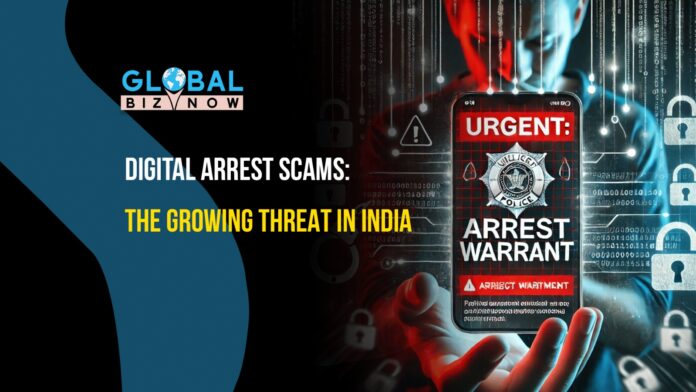In 2024, cybercrime unbelievably hiked to the tune of Rs 19,888.42 crores in India. In comparison to the year 2023 where it was Rs 921.59 crore only, it is without doubt, a very scary phenomenon. The digital arrest scam is one of the most common and potentially the most risky type of frauds in India. Experts are of the opinion that because most of the victims are afraid to report or unaware of the cyber scams, this will be only a part of the whole truth that we will know.
In this article we should take a deep look at how these scams manipulate people, why they are so effective and how not to fall prey to these scams.
What is a Digital Arrest Scam?
The way it generally happens is through a video call or phone call that is initiated by a person who, to be more specific, is pretending to be a representative of an organization responsible for imposing law and order, such as the Reserve Bank of India (RBI) or the police. The scammers might also imitate courts or put the many victims across several trials to scare them. These bogus creators build a doomsday scenario for the victim by threatening them with arrests, jail time, or a criminal investigation if they don’t give them money immediately.
From the point of view of the perpetrator, the victim is given a message that the criminal act under investigation is some form of a dangerous package being sent by mail, a criminal case being filed against them. The requirement from the victim is to transfer funds to a fake account that is “special” and it is somehow under the watch of the government in order to meet their goal of not being arrested. The scammers can then promise once the victim’s details have been checked, that the cash would be repaid.
How Do Victims Fall for the Scam?
The convincingness of digital arrest scams determines their success. Scammers thoroughly investigate their victims. They appear legitimate since they might be aware of your past online purchases or possess personal information about you. They occasionally even know your family members’ names, and occasionally they employ artificial intelligence (AI) to mimic voices to make it seem as though a loved one is in danger.
In order to make their calls and video communications seem authentic, scammers also use professional props, such as official-looking clothes, fake identification certificates, and documents with government agency insignia. To put more strain on the issue, they frequently pose as high-ranking authorities,thus giving it a genuine and urgent feel.
These scams tap into your fears. You might feel guilty about something you’ve done, like ordering a product online, and this vulnerability makes you more likely to believe the threats. The sense of panic makes it harder for victims to think rationally.
Who Are the Scammers?
Actually, many digital arrest scams are operated from countries such as Cambodia, Laos, and Vietnam even though the criminals may want you to think that they are based in India. They run these scams in some casinos that had been closed down because of the pandemic and got modified into “fake compounds.”
Most of these operations target the Indian youngsters and lure them with job offers in these countries. Cryptocurrency is used to send a large portion of the money to other countries, including through illegal gambling and deceptive investment websites.
Why Are These Scams So Successful?
In this digital era, scammers are finding things very easy as they can easily get private pieces of information about their targets in a way that they can influence them. For example, they have even resorted to the form of real calling and they, therefore, mimic it through video calling applications like Skype. The use of new technologies has made it easier to impersonate authorities and to even pressure the victims in real time. One obvious method that people could use has to be developing their security habits by not clicking suspicious links and ensuring that their devices, including routers, are properly configured and all software are always up to date. Firewalls are essential in protecting computers by not only rejecting unauthorized connection activities.
How Can You Protect Yourself?
On the web, nothing can save you better from a digital trap than the right level of awareness. Here are some steps you can take to prevent yourself from becoming a victim:
Keep an Eye Out for Red Flags: There is no government authority such as the police or immigration department that will contact you via phone or through video call and ask you for money. Suspiciously, you usually get messages like “You are being investigated!” or “You owe me your money!” Disregard them at once.
Never provide your personal information: Always think about the consequences of sharing personal information, especially when it relates to the internet. Scammers can use this information to manipulate you.
Do Not Panic: Fraudsters give false information about the shortness of time to make you act without having ample time to think. If you ever feel that someone is pushing you to send money as quickly as possible then stop the process and take some time.
Inform the Authorities: Alert the authorities and share the suspicious event with them if you suspect an attack. The quicker you act, the greater the chance that authorities will be able to stop the scam. One can use Chakshu portal to report the scam online or India’s national helpline (1930) through which one can dial their local police stations to report their cybercrimes.
Build Knowledge: Tell friends and family about digital arrest scams to raise their awareness. The fewer victims there are as the fraud is discovered by more people.
It is a sad fact that digital arrest scams are not just a widespread danger but also a growing one so it is important to be more cautious. Never take unconfirmed text messages at face value. Official agencies will never ask for money in order to prevent your arrest. So be vigilant and stay updated.



